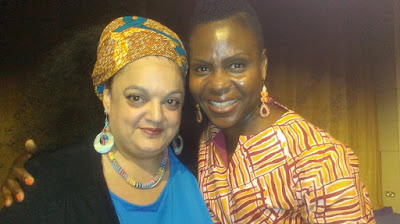BARAC UK are working with The New Black Film Collective (TNBFC) campaigning against institutional racism in the film industry.
In the past months we have supported and participated in a wide range of campaigns against institutional racism in the arts and culture sector and the disproportionate impact of austerity on the sector.
This has included Boycott the Human Zoo, Show Culture Some Love, the PCS union campaign against privatisation at the National Gallery, Race Equality in the Music Industry and now the Dear White People UK campaign.
The BFI has refused lottery funding to distribute the film Dear White People in the UK even though by their own admission it meets their criteria and cinemas have been reluctant to screen it, especially outside of London with no cinemas agreeing a standard 7 day run.
This week the BBC interviewed Director of TNBFC, Priscilla Igwe together with a spokesperson from the BFI who was unable to explain their rejection of the film, you can listen here.
We can only conclude in the absence of any other explanation offered by the BFI or those cinema chains rejecting it that institutional racism lies at the heart of their decision.
TNBFC has now lodged an appeal against the BFI decision, we challenge them to do the right thing and not only apologise for their blatant attempt to ghettoise the film as only suitable for black audiences but to grant lottery funding for its distribution.
Racism is deepening every day and the film offers an opportunity to initiate dialogue about some of the issues explored in it. Whilst the film is set in a USA university, highly racist and offensive 'blacking up' is something that has taken place in universities in the UK as recently as this year; Stirling University Students Black Up and York University students black up for fancy dress prank. These types of horrific events and the discrimination and isolation that black students face in the UK, in addition to the disproportionate impact of austerity on black students, mean that the work of the NUS Black Students Campaign is essential.
Black deaths at the hands of the State is a concern both in the USA and in the UK, since BARAC was formed in 2010 we have supported a number of family justice campaigns, a week ago we saw the horrific mass murder of worshippers at the Emanuel African Methodist Episcopal Church in Charleston, yet the media both in the USA and the UK have been reluctant to call it out for what it is, a terrorist attack by a racist supremacist even though the murderer himself declared his racist intent. The church, one of the oldest black churches in the USA was burned down in 1822 and 35 people were hanged in response to a slave rebellion.
A debate has followed in recent days about the permanent removal of the Confederate flag in the US because of its historic connection to racism and the fact that photos were found of the killer posing with the flag.
Last week BARAC sent an all black woman team of volunteers to work at Glastonbury Festival but they had not anticipated yet another campaign against racism in arts and culture whilst there. After only one day at the renowned music festival, they were shocked to discover a Confederate flag on display. They staged a picket outside the staffing area the flag was situated in order to force its removal by the festival organisers but we believe that questions must be asked as to the intent of those bringing the flag to the festival in the wake of such a brutal racist massacre associated with the Confederate flag and will be writing to Glastonbury about this.
Racism is deepening every day and the film offers an opportunity to initiate dialogue about some of the issues explored in it. Whilst the film is set in a USA university, highly racist and offensive 'blacking up' is something that has taken place in universities in the UK as recently as this year; Stirling University Students Black Up and York University students black up for fancy dress prank. These types of horrific events and the discrimination and isolation that black students face in the UK, in addition to the disproportionate impact of austerity on black students, mean that the work of the NUS Black Students Campaign is essential.
| The nine people who were murdered in Charleston |
Black deaths at the hands of the State is a concern both in the USA and in the UK, since BARAC was formed in 2010 we have supported a number of family justice campaigns, a week ago we saw the horrific mass murder of worshippers at the Emanuel African Methodist Episcopal Church in Charleston, yet the media both in the USA and the UK have been reluctant to call it out for what it is, a terrorist attack by a racist supremacist even though the murderer himself declared his racist intent. The church, one of the oldest black churches in the USA was burned down in 1822 and 35 people were hanged in response to a slave rebellion.
| Bree Newsome has now been arrested for taking down the flag in the USA #FreeBree |
A debate has followed in recent days about the permanent removal of the Confederate flag in the US because of its historic connection to racism and the fact that photos were found of the killer posing with the flag.
 |
| BARAC team at Glastonbury led by BARAC Women's Officer, far right, Donna Guthrie |
Last week BARAC sent an all black woman team of volunteers to work at Glastonbury Festival but they had not anticipated yet another campaign against racism in arts and culture whilst there. After only one day at the renowned music festival, they were shocked to discover a Confederate flag on display. They staged a picket outside the staffing area the flag was situated in order to force its removal by the festival organisers but we believe that questions must be asked as to the intent of those bringing the flag to the festival in the wake of such a brutal racist massacre associated with the Confederate flag and will be writing to Glastonbury about this.
 |
| Confederate Flag found at Glastonbury |
Racism is very real and its effects are deep and harmful. Black Lives Matter and It is time that the BFI puts in place robust equality monitoring and equality proofing systems, ensuring that those who make the decisions are representative of the communities and diverse population that they are supposed to serve. if the BFI really believe that a film entitled Dear White People which explores race and racism is only for black people to view, then are they suggesting that the racism experienced by black people is a problem for black people to address and not the perpetrators?
How do young black film makers in the UK stand a chance of getting a platform for their work with attitudes like this from the BFI?
How do young black film makers in the UK stand a chance of getting a platform for their work with attitudes like this from the BFI?
As the general release date is only a couple of weeks ago we want to present the campaign petition to the BFI - please help us to build the petition by signing and sharing widely here.
Well known people who have signed the petition include Clive Lewis MP, Assistant General Secretary of Unison, Roger McKenzie, actresses Dona Croll and Judith Jacob and broadcasters Rosemary Laryea and Jasmine Dotiwala.
 |
| Photo by: T Cobham, all rights reserved |
We are grateful to John McDonnell MP for hosting a screening and post-film discussion in the Houses of Parliament about how we challenge institutional racism in the film industry which took place on June 24th. Speakers included Co-Chair of BARAC UK Zita Holbourne and Director of TNBFC, Priscilla Igwe. Jeremy Corbyn MP also took time out of his busy schedule to attend and give support. Those in attendance committed to support the campaign and bring together the various campaigns against race discrimination in the arts and culture sector in joint campaigning activities.
 |
| Left to right, Priscilla Igwe, Zita Holbourne, John McDonnell MP Photo by : T Cobham, all rights reserved |
John McDonnell MP talked about film being a powerful medium for challenging negative views, Priscilla Igwe talked about the challenges she has faced trying to get the film distributed and her commitment to doing so and Zita Holbourne talked about the link between austerity and cuts and the deepening institutional racism in the film and wider arts sector.
 |
| Zita Holbourne & Jeremy Corbyn MP Photo by T Cobham, all rights reserved |
In the same week the film was screened as part of the Images of Black Women Film Festival at the Tricycle in Kilburn, London, followed by a post film Q&A with Rosemary Laryea and Zita Holbourne. The film received a very positive response from the audience who also endorsed the campaign to get it screened and challenge the institutional racism in the industry.
 |
| Zita Holbourne & Rosemary Laryea |
Links to the campaign media, social networking, forthcoming screenings and events can be accessed via the website www.dearwhitepeoplemovie.co.uk. #dearwhitepeopleuk
 |
| Dear White People cast |
Zita Holbourne; National Co-Chair BARAC UK



